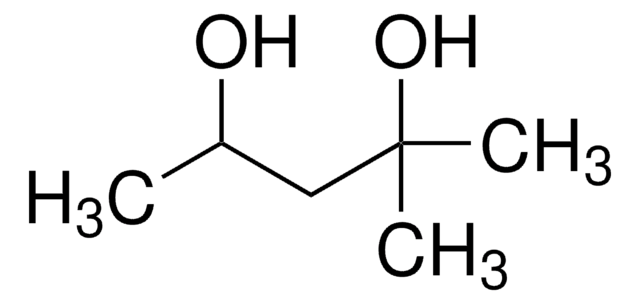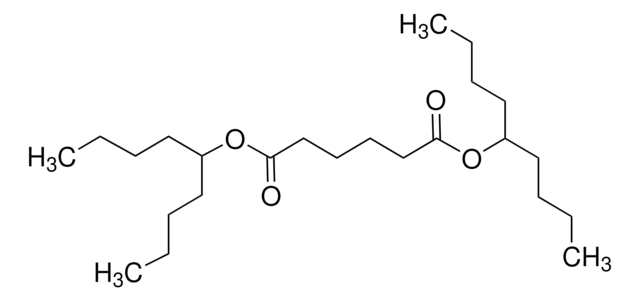Alle Fotos(1)
Wichtige Dokumente
81392
Poly(vinylchlorid)
Selectophore™, high molecular weight
Synonym(e):
PVC
Anmeldenzur Ansicht organisationsspezifischer und vertraglich vereinbarter Preise
Alle Fotos(1)
About This Item
Lineare Formel:
(CH2CHCl)n
CAS-Nummer:
MDL-Nummer:
UNSPSC-Code:
26111700
PubChem Substanz-ID:
NACRES:
NB.61
Empfohlene Produkte
Qualität
for ion-selective electrodes
Qualitätsniveau
Produktlinie
Selectophore™
Form
powder
Viskosität
2.0-5.0 mPa.s, 3 % in THF(25 °C)
Dichte
1.4 g/mL at 25 °C (lit.)
SMILES String
ClC=C
InChI
1S/C2H3Cl/c1-2-3/h2H,1H2
InChIKey
BZHJMEDXRYGGRV-UHFFFAOYSA-N
Suchen Sie nach ähnlichen Produkten? Aufrufen Leitfaden zum Produktvergleich
Allgemeine Beschreibung
Finden Sie mehr Informationen auf unserem Sensor-Applikations-Portal.
Poly(vinyl chloride), popular as PVC, is a polymer which is prepared from vinyl chloride monomer via polymerisation. It can never be used as such and is mostly mixed with heat stabilizers, lubricants, plasticizers, fillers, and other additives. Due to its high chemical resistance property it finds wide application in construction and lining of chemical plants.
Anwendung
It has been used to fabricate Aluminum(III) selective potentiometric sensor from PVC matrix membrane which has morin ionophore.
Rechtliche Hinweise
Selectophore is a trademark of Merck KGaA, Darmstadt, Germany
Lagerklassenschlüssel
11 - Combustible Solids
WGK
WGK 3
Flammpunkt (°F)
Not applicable
Flammpunkt (°C)
Not applicable
Persönliche Schutzausrüstung
dust mask type N95 (US), Eyeshields, Gloves
Hier finden Sie alle aktuellen Versionen:
Besitzen Sie dieses Produkt bereits?
In der Dokumentenbibliothek finden Sie die Dokumentation zu den Produkten, die Sie kürzlich erworben haben.
Kunden haben sich ebenfalls angesehen
Poly (vinyl chloride).
Allsopp, Michael W., and Giovanni Vianello.
Ullmann's Encyclopedia of Industrial Chemistry (1992)
Aluminum (III) selective potentiometric sensor based on morin in poly (vinyl chloride) matrix.
Gupta, Vinod K., Ajay K. Jain, and Gaurav Maheshwari.
Talanta, 72.4, 1469-1473 (2007)
Christopher B Stipe et al.
Applied spectroscopy, 66(11), 1286-1293 (2012-11-14)
Airborne silica dust (quartz) is common in coal mines and represents a respiratory hazard that can lead to silicosis, a potentially fatal lung disease. With an eye toward developing a portable monitoring device for rapid analysis of silica dust, laser-induced
T D Ambrisko et al.
British journal of anaesthesia, 110(2), 305-310 (2012-11-21)
In a previous study, the authors found a large bias (50%) for lithium (LiDCO) compared with thermodilution cardiac output measurement methods in ponies receiving i.v. infusions of xylazine, ketamine, and midazolam. This prompted the authors to examine the effect of
Tariq Hussain et al.
International journal of pharmaceutics, 441(1-2), 781-789 (2012-10-16)
Electrostatic charge is generated during powder handling due to particle-particle and particle-wall collisions, rubbing, sliding, and rolling. In case of bipolar charge generation, the electrostatic forces may significantly change the inner forces and increase powder adhesion and cause a serious
Unser Team von Wissenschaftlern verfügt über Erfahrung in allen Forschungsbereichen einschließlich Life Science, Materialwissenschaften, chemischer Synthese, Chromatographie, Analytik und vielen mehr..
Setzen Sie sich mit dem technischen Dienst in Verbindung.








